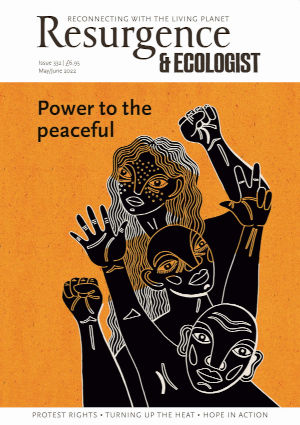In over 30 years of environmental activism, I’ve collected a small library of books on campaigning and surviving the emotional costs it can incur. These include Earthforce!, by Sea Shepherd founder Paul Watson, a brusque set of instructions for direct activists, and Rebecca Solnit’s Hope in the Dark, which urges us to reset our personal despair over ecological damage.
Anthea Lawson’s The Entangled Activist takes its place among these by asking why campaigners unconsciously replicate “so many aspects of the systems we don’t want”. This question troubled Lawson while working for human rights organisations and led her to consider that the answer lay in the lack of attention to the ‘inner life’ of activism and “how the damage that is caused by the systems we are trying to change runs through us too”. From this starting point, Lawson sets out to examine how activists are ‘entangled’ in the problems they are trying to fix and in a mix of guilt, urgency, moral righteousness and sometimes seeing themselves as heroes or saviours.
Lawson draws heavily on her experiences of working for a number of humanitarian organisations and attending London street protests, including Extinction Rebellion demonstrations. She writes candidly about burnout, the combination of physical and mental fatigue frequent among campaigners across many movements, and considers the unhealthy culture that can exist in charities, such as workplace bullying and cover-ups of sexual abuse. Lawson is also honest about the context for her book, acknowledging that she writes from a UK perspective, that her experience is framed by her background, and that professional campaigning in Britain tends to be a middle-class domain. She does, however, include extensive interviews with fellow activists from across the globe, which gives the book a wider reach and includes reflections on the ‘white gaze’ of much campaigning work. Although my experience is somewhat different from Lawson’s, as I have always worked outside of the campaigning sector, I recognised the patterns of overwork, exhaustion and guilt, along with their impacts both on the individual and on how campaigners relate to the ‘non-activists’ around them.
Having set out her ideas and background, Lawson offers a series of chapters with titles I immediately wanted to turn to, such as ‘Common Habits of Entangled Activists’. Each of these is extensively researched and meticulously referenced and draws on many concepts from psychology and philosophy. Among those quoted are Carl Jung, Audre Lorde, Oliver James and novelists from Ben Okri to Terry Pratchett. When I first picked up the book, I was concerned that the concepts and theories examined would be hard to grasp for a reader not drilled in psychological studies. I was quickly reassured, as Lawson’s research is well handled, and each new idea is carefully and clearly explained. Although the book ends with a series of questions for groups or individuals to consider or discuss, the emphasis is on well-informed reflection rather than self-help.
The Entangled Activist deserves a place in my library, although I did find myself reflecting that it is important never to lose sight of the many gains, from workers’ rights to environmental protection, brought about by protest or lobbying. As I read Lawson’s book I recalled that, in my own life, activism has frequently been hard but also a source of joy, and how campaigning, usually alongside compassionate and dedicated people, has often maintained my faith that collective action is an important catalyst for change.







